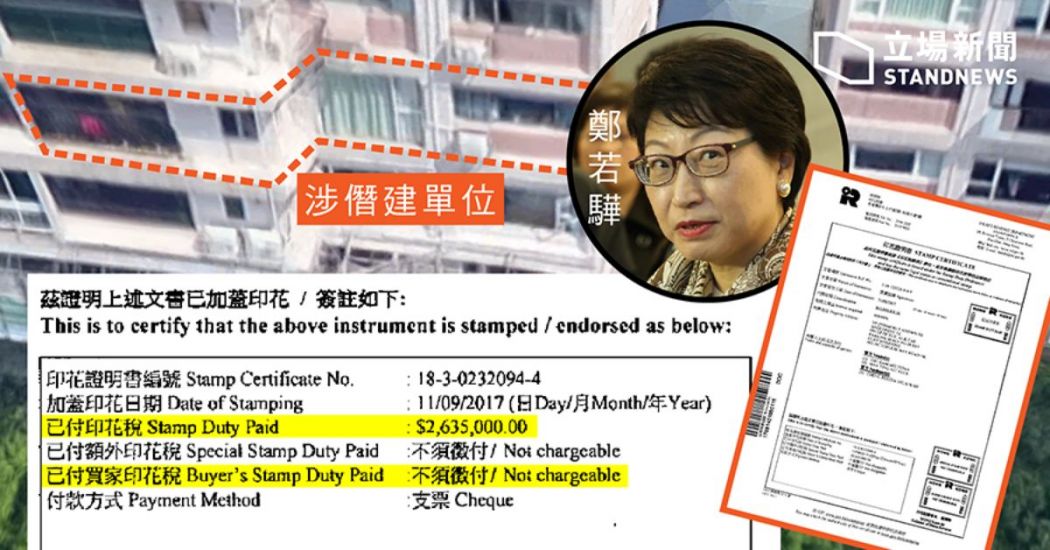New Secretary for Justice Teresa Cheng saved around HK$6.7 million in stamp duty as she bought a HK$62 million flat last year as a first-time buyer, despite owning several other properties.
She purchased a Southern District property – Sea Cliff Mansions on Repulse Bay Road – in her own name in September last year. However, she had bought several other properties before this purchase in the names of her companies Sparkle Star Development, Westland Investment and Super Alliance Co. Ltd.
The sales and purchase agreement showed that Cheng paid stamp duty of HK$2.635 million – 4.25 per cent of the flat price – the rate for first-time buyers. She declared that the property was to be used for leasing.

If she was not purchasing the property as a first-time buyer, she would have needed to pay 15 per cent in stamp duty – totalling HK$9.3 million. Had she have bought the property using a company, she would have to pay an extra 15 per cent in stamp duty – HK$18.6 million in total.
The government’s stamp duty policy for first-time buyers was intended to help citizens get onto the property ladder.
See also: Buildings Dep’t accepts plan to demolish illegal structures at Justice Sec. Teresa Cheng’s house
Illegal structures were found at the Southern District flat. The sales and purchase agreement signed by Cheng’s husband on her behalf stated that “the Purchaser acknowledges that the Property contains illegal structures” and that “the relevant conditions did not apply for any approval nor obtain any approval from Government.”
Simon Peh, Commissioner of the Independent Commission Against Corruption, visited Cheng’s office at around 4pm on Monday, reported Apple Daily. Neither made any comment.
No confidence
Legal sector lawmaker Dennis Kwok said it was technically feasible for Cheng to buy the flat as a first-time buyer. However, he had reservations as Cheng would need to make a statutory declaration that she did not effectively hold ownership of other residential flats for occupation in Hong Kong.

“If I were her, I would not dare to sign the declaration… if I know I have four wholly-owned company holding properties,” he said on a RTHK programme on Tuesday. “It gives a very bad impression.”
Kwok said if Cheng kept avoiding answering questions at the Legislative Council, the pro-democracy camp would raise a motion of no confidence.
Pro-Beijing lawmaker Paul Tse, also a solicitor, said that even his camp had turned impatient over how Cheng had handled the incident.
“The public’s patience has been exhausted,” he said. “It is getting more and more difficult for the pro-establishment camp to help and support her… We have to know what the real situation is, but the incident has been getting worse and worse – what is the real situation?”
Asked if he will support calls for Cheng to resign, he said he has to listen to more explanations and consider the whole situation: “Currently I don’t see very important factors [to support Cheng], I am inclined to feel ‘better to suffer short-term pain rather than long-term torture.’”
He would not state clearly as to whether he would support a motion of no confidence.
Other properties
According to Cheng’s declaration of interests form released on Monday, she also has a property in Tuen Mun – which sparked the illegal structure scandal – as well as a residential property in Sha Tin for family members. She also has an industrial property in Sha Tin for family storage, a residential property in Beijing for occasional self-occupation and a vacant residential property in Yunnan.

The declaration also stated that she is a member of the Hong Kong Jockey Club, Hong Kong Club, Royal Hong Kong Yacht Club, and Clearwater Bay Golf & Country Club.
Since her appointment, she has attracted heavy criticism over the illegal structures at her Tuen Mun home. Cheng, who has degrees in engineering and law, sat on a Buildings Ordinance tribunal and co-wrote a book on construction law – said she failed to notice the structures because she was “very busy” when the house was purchased.
